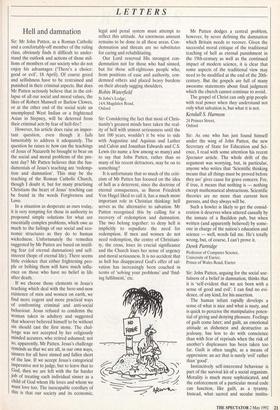LETTERS Hell and damnation
Sir: Mr John Patten, as a Roman Catholic and a comfortably-off member of the ruling class, obviously finds it difficult to under- stand the outlook and actions of those mil- lions of members of our society who do not enjoy his advantages ('There's a choice: good or evil', 18 April). Of course greed and selfishness have to be restrained and punished in their criminal aspects. But does Mr Patten seriously believe that in the col- lapse of all our social and moral values, the likes of Robert Maxwell or Barlow Clowes, or at the other end of the social scale an unemployed West Indian or a frightened Asian in Stepney, will be deterred from their criminal acts by fear of hell-fire?
However, his article does raise an impor- tant question, even though it fails lamentably to address it adequately. The question he raises is: how can the teachings of Jesus of Nazareth be brought to bear on the social and moral problems of the pre- sent day? Mr Patten believes that the fun- damentals of Jesus's teaching are 'redemp- tion and damnation'. This may be the teaching of the Roman Catholic Church, though I doubt it, but for many practising Christians the heart of Jesus' teaching can be found in the words Forgiveness and Love.
In a situation as desperate as ours today, it is very tempting for those in authority to propound simple solutions for what are essentially complex problems, which owe as much to the failings of our social and eco- nomic structures as they do to human wickedness. Unfortunately the remedies suggested by Mr Patten are based on instill- ing fear (of eternal damnation) and self- interest (hope of eternal life). There seems little evidence that either frightening peo- ple or bribing them will have much influ- ence on those who have no belief in life after death.
If we choose those elements in Jesus's teaching which deal with the here-and-now existence of men and women on earth, we find more cogent and more practical ways of confronting criminal and anti-social behaviour. Jesus refused to condemn the woman taken in adultery and suggested that whoever believed himself to be without sin should cast the first stone. The chal- lenge was not accepted by her religiously minded accusers, who retired ashamed; not so, apparently, Mr Patten. Jesus's challenge reminds us that we are all, in our own ways, sinners for all have sinned and fallen short of the law. If we accept Jesus's categorical Imperative not to judge, but to leave that to God, then we are left with the far harder job of treating each individual sinner as a child of God whom He loves and whom we must love too. The inescapable corollary of this is that our society and its economic, legal and penal system must attempt to reflect this attitude. An enormous amount remains to be done in all these areas. Con- demnation and threats are no substitutes for caring and rehabilitating.
Our Lord reserved His strongest con- demnation not for those who had sinned, but for those self-righteous people who, from positions of ease and authority, con- demned others and placed heavy burdens on their already sagging shoulders.
Robin Water field
St John's Lodge, 14A Magdalen Road, Oxford


















































 Previous page
Previous page